
COLLECTIONS

Maurice Ravel: Miroirs Nikolai Medtner: Second Improvisation (in variation form), Op. 47
My apologies to Maurice Ravel, but the focus of this review will lie squarely on the music of Nikolai Medtner (1880-1951). Not that Miroirs by Maurice Ravel is not a great piece of music. It's actually one of his most inspired and innovative works for solo piano, but given the fact that it is already well known and benefits from over 60 extant recordings as opposed to only one (as far as I know) of the Medtner, I figured more ink (or in this case binary bits) should be spent trying to shed more light on the music of this unjustifiably neglected Russian composer of German descent. Both works deal within the realm of fantasy in an effort to capture the essence of mysterious subjects like night moths, birds, bells, nymphs, water, goblins and elves, but from completely differing perspectives. Ravel painting an impressionistic image based on visual or physical triggers, and Medtner trying to convey the metaphysical aspects an image impresses on the soul.
For one thing, as opposed to Ravel's mercurial and volatile sound and style, Medtner's music is much more harmonically dense and opaque, like an extension of the line established by Brahms and Reger. And this set of 15 variations based on a theme titled Song of the Water Nymph sounds more like a set of Piano Studies tossing a multitude of harmonically intricate technical hurdles at the performer, all the while painting highly passionate abstract imagery. Maybe a better way to describe what lies at the core of Medtner's music, is to fuse together the Slavic romantic ideals of Rachmaninov with the spiritual and cosmic mysticism of Scriabin. Obviously, like these composers, the piano was his instrument of choice, as he explores and exploits all the instrument has to offer. For example Variation 3: Feathered Ones very much reminds me of the Ballet of the Chicks from Mussorgsky's Pictures at an Exhibition but requires much more fingering versatility and agility from the pianist. Or if there ever was a piece requiring quicksilver coordination and pinpoint accuracy as both hands dash in opposite directions, Variation 10: Elves would be a great example. And like all great composers, within this complex external scaffolding, Nikolai Medtner could paint delicate and highly evocative imagery. Evidence that Medtner was a master of the keyboard, is that the great Marc-André Hamelin himself, known for seeking out "difficult" music by composers relegated to the basement filing cabinets, has recorded all of Medtner's Piano Sonatas and his Piano Concerto No. 2.
And it seems pianist/composer Michael Brown might be cut from the same cloth, since some of his previous recordings explore the music of Bernstein, Adler, Messiaen, Beach, Perle, as well as his own compositions. And oddly enough, one of his projects over the next few years, is to record all of Mendelssohn's piano music. As evidenced by his interpretation of Une barque sur l'océan from Ravel's Miroirs, his technique is crystalline, dynamically fluid and deeply expressive. And at the other end of the spectrum, as in the closing piece of Medtner's work, he can just as well evince the darker side of a piano's sonorities.
And all of you Nikolai Medtner enthusiasts (I know you're out there somewhere) might be happy to hear that this new release includes premiere recordings of two newly discovered unnumbered variations that were part of an 89 page document of sketches of the Second Improvisation that was discovered in, of all places, the National Library of Canada in Ottawa (my birthplace by the way). As Michael Brown points out in the booklet notes, it took him months of trial and error before coming to a final decision as to their placement within the numbered variations. Titled Pesante and La Cadenza they sound thoroughly at home within the set's framework.
Jean-Yves Duperron - January 2021